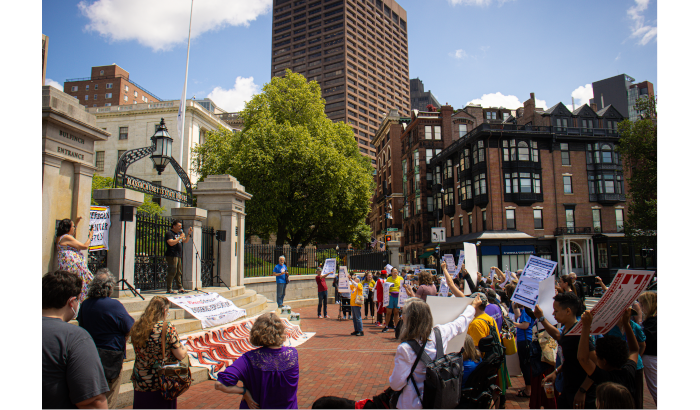The reduction to the Healthy Incentives Program cut monthly benefits for low-income families, but a higher proposed budget may bring back full payments as soon as July 1
The Healthy Incentives Program, which has brought healthy food to low-income families and boosted local farms and economies, may return to its full functionality as soon as July after the state Senate proposed a $25.4 million budget for the program for fiscal year 2026. The program has seen great success since its start in 2017 but has repeatedly been paused, made seasonal, or reduced since. Most recently, the program’s benefits were severely cut, with families receiving half to as little as a quarter as much monthly money for healthy local foods. The Massachusetts Department of Transitional Assistance and Massachusetts Department of Agricultural Resources decision to reduce benefits followed insufficient funding for last fiscal year.
HIP refunds all SNAP purchases on Massachusetts farm produce at farmers markets, mobile markets, CSAs, or farm stands. Benefits range based on family size; normally, families of one to two receive $40 a month, families of three to five receive $60 a month, and families of six and larger receive $80 a month. But following a December 2024 cut to the program, benefits have been reduced to $20 a month per household regardless of family size. While cuts have happened in the past, like monthslong suspensions of the program in 2018 and 2019, the December cut was new in that rather than fully pausing HIP, it instead reduced benefits.
The cutback in benefits caused a dramatic reduction in new households using HIP. While a drop in new HIP users is typical of winter, December through March this year had up to 62% fewer new HIP households than the same period in 2024. Atlas Farm, a Deerfield family farm with a farmstand in South Deerfield saw a 27% drop in SNAP sales in December compared to the year before, according to Atlas Farm Store owner and manager Kelly Hickey. “Typically, we’re up 15%,” she said. “By February, we were down 40% in SNAP sales. Especially for the wintertime, it’s just not worth it for people to come out for the $20.” A reliance on SNAP sales has also meant economic uncertainty for farms.
“I don’t think there’s any doubt that HIP is a triple win,” said Becca Miller, policy director for the Massachusetts Food System Collaborative, for low-income families, local economies, and farmers. As of April 2025, almost 210,000 households in the state benefit from the program. While there hasn’t been a comprehensive study of the program since the Collaborative conducted one in the program’s first year—finding a 600% increase in SNAP sales at farms and that each HIP dollar spent generated $1.12 in local economic impact—individuals have felt the positive effects of the program.
“Anecdotally, we hear about folks being able to take fewer medications, feel more connected to their communities, feel less socially isolated, or introduce their kids to vegetables,” Miller said. In turn, cuts to the program have been noticeable. “People definitely are feeling the impact in a really big way,” Hickey said of the cuts. “This past week, I had one of our regular customers driving away in his car yelling, ‘Kelly, get our $40 back!’” she added.
Massachusetts has fully funded HIP since 2018, so when the program was granted $15 million last fiscal year, “me and my partners in the legislature, and the advocates I work with,” said Miller, “knew it was not gonna be enough to last the fiscal year.” The December 2024 cut was announced that October, and Miller said the Department of Transitional Assistance didn’t get enough lead time to prevent the cut.
“It’s mostly just a matter of raising it to the level of attention it needs, Miller said, “and if a cut goes into effect, in my perspective that’s a pretty alarming scenario.” Each suspension or rollback of HIP has hurt trust in the program for HIP earners, and while the December cut didn’t fully suspend the program, it hurt low-income families’ use of and trust in HIP. “Essentially, I feel like this is basically the same,” Hickey said about this cut compared to a full suspension.
“Customers lose trust in these systems the more unstable they are,” said Grace McKay, market manager at Mill City Grows, a Lowell-based food-justice nonprofit with urban farms, mobile stands, and educational programs. McKay says she often has conversations about how confusing both the program and its pauses have been with customers. Hickey says that she still gets calls from SNAP recipients about a short pause in HIP in 2021 asking if it is back.
Even without cuts, it is often a struggle to explain how the convoluted program works. HIP works as a reimbursement for SNAP purchases. Each transaction purchasing HIP approved foods is refunded to your card—if someone with just $1 on their SNAP card wants to use the full $20 benefit, they would need to conduct 20 individual transactions, holding up lines and disincentivizing the program’s use at all, said McKay. “Not only to grasp how the system works, but to be constantly pulling the rug out from these folks, is so disorienting,” she said.
SNAP and HIP sales were 50% of Mill City Grows income in previous years, but McKay predicts that number may be as low as 20% this year. For-profit Atlas Farm typically receives 15-20% of its sales from SNAP, but has recently seen that number drop to 6-8%, Hickey said. Previously, cuts got major backlash and advocacy, not just from the Massachusetts Food System Collaborative, which has worked with state legislators like Hannah Cane and Joanne Comerford to advocate for a higher budget, but from SNAP recipients, who Hickey says reached out to legislators en masse after Atlas Farm Store put up multilingual educational materials.
The cuts have been devastating for Massachusetts farmers, who already operate off of thin to negative margins, according to the USDA agriculture census. Some farms have had to cut staff and restructure their business model, Miller said. As the cuts remained in effect past December, uncertainty has also hurt farmers who are unsure when full SNAP benefits, a large portion of their income, will return, she added.
Currently, the House has proposed $20.1 million in funding for HIP and the Senate has proposed $25.4 million, the latter proposal being what Miller says the program will need to return to its higher, tiered benefits. “Massachusetts is looked to as a national leader in these types of programs,” she said. “There’s no other state that funds these programs like we do.” Despite this, and the fact that HIP is fully state funded, the Trump administration’s federal funding cuts still pose a threat. “Any one of those federal cuts,” Miller said, “could more than wipe out our rainy day fund.”
“We saw under a Democratic president and a Democratic governor that the state did not allocate enough money to HIP,” McKay said. “That happened before this crazy administration.” Nevertheless, the Trump administration still carries another serious threat to HIP through its immigration policy. “If people are afraid to leave their homes, afraid to go shopping because they’re afraid of interaction with ICE,” McKay said, “that’s, first of all, a huge safety issue for them and everyone in their community. And, no one’s coming to the market.”
Because of grassroots advocacy and efforts from the Massachusetts Food System Collaborative, Miller thinks the program has a good chance of being restored to full operation. “I’d like to think we still live in a responsive democracy in the Commonwealth,” she said. While the Senate’s proposed $25.4 million would bring HIP fully back, Miller and Hickey believe more should be done to enshrine the program’s place in the state budget by finding a dedicated revenue source and codifying the program. While several state senators sponsored an amendment to do both, the amendment was rejected.
If the program were restored, “it would make me feel excited to tell customers,” McKay said, “and at the same time, kinda disappointed in the state budget not funding it fully last year.” If the House budget proposal of $20.1 million ends up as HIP’s budget, Miller says that might only be enough for $30 per household, regardless of family size.
Massachusetts’ budget for fiscal year 2026 will be finalized and take effect in July.
7/7/2025 UPDATE: The Massachusetts budget for the 2026 fiscal year, signed July 4, did not allocate enough money to HIP to bring it back to its full benefits. The $20.1 million budget, suggested by the House, will likely increase monthly benefits from $20 to $30, regardless of family size. It is unclear whether the program will face a similar cut as it did last year, when it received only $15 million.
This article was produced for HorizonMass, the independent, student-driven, news outlet of the Boston Institute for Nonprofit Journalism and is syndicated by BINJ’s MassWire news service.






